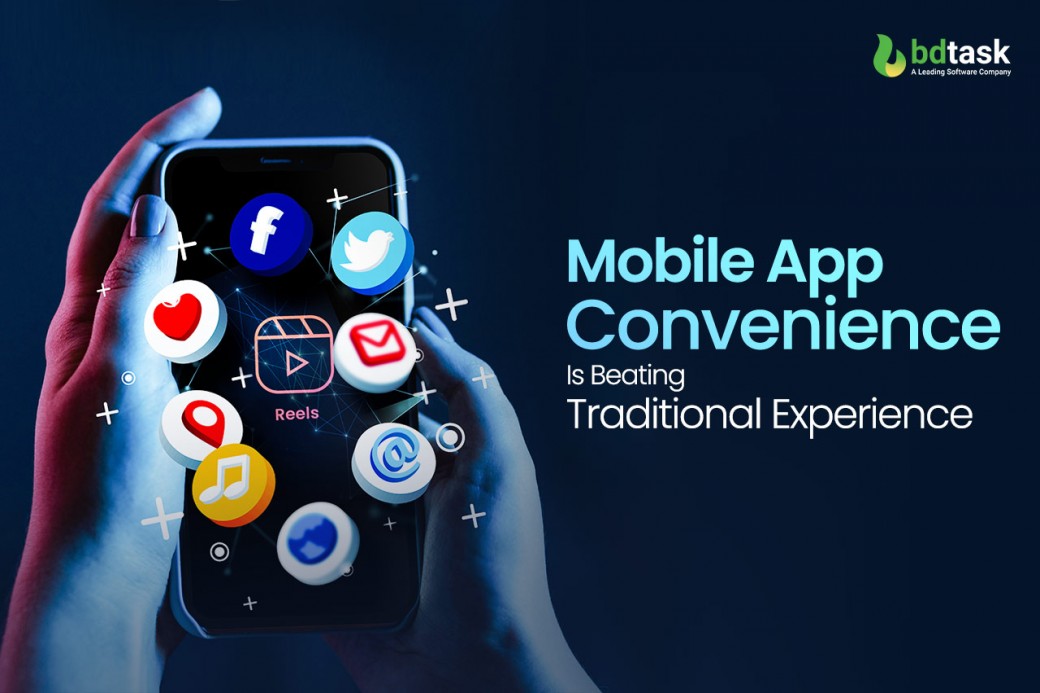Why mobile App Convenience Is Beating Traditional Experience

Mobile apps have become an integral part of our daily lives and have changed the pattern of our lives. This is so obvious. But why mobile app convenience is beating traditional experience? The answer is that technology is too advanced, and every new technology is coming which helps to change and make an impact on people's lifestyles.
It does not matter whether it is some food delivery apps, a car taxi, or bills; mobile apps have found their way into almost everything. Things of the past, such as queuing, calling customer support services, or doing documents, are gradually disappearing. People no longer have time to go through traditional methods, which take time to complete a task, but they choose to do things in seconds once they tap a screen.
Apps like Uber let you book a ride in under a minute. With Instacart, groceries show up at your door without setting foot outside. Banking apps such as Revolut or N26 help you manage your money with just a few swipes. It is not all about technology in these apps.
They are signs of a larger change: a transition toward effortlessness and speed. And when people get this level of convenience, it isn't easy to switch back to the previous one.
In this blog, we will learn why mobile app convenience of beating traditional experience and what the benefits are.
So, let's start!
What Is The Main Purpose Of A Mobile Application?
A mobile app or mobile application is a software application developed specifically to use a small and wireless computer device. The primary purpose of a different type of mobile application is to provide consumers or users get quick, convenient, and efficient access to their queries. Improving the user experience saves time for users and gives compact results. It makes a real difference in daily life through real-time communication, seamless interaction, offline access, and personalized content. As a result, mobiles app improves the productivity level of daily activities in various industries .
What Industries Have Been Most Transformed By Mobile Apps
Not only do people benefit from the transformation, but different industries are also significantly transformed by the widespread adoption of mobile apps. Mobile apps change the way customers serve, shop, learn, and participate in health management and other industries.
We will list down ten industries that have successfully and fruitfully automated their processes using mobile applications and probe how they have changed how we live, work, and relate to each other. Includes :
- Retail (e-commerce)
- Banking & Finance (mobile banking, wallets)
- Healthcare (telemedicine, appointment booking)
- Transportation (ride-sharing, navigation)
- Food & Beverage (delivery apps, online reservations)
- Education Industry
- Entertainment Industry
- Real Estate Industry
- Fitness And Wellness Industry
- Online Gambling Industry
Apart from that, it brings many advantages to our daily lives. Check some of those in the next sections and explore their real advantages.
Why App Convenience Is Beating Traditional Experience - Key Benefits
According to Statista, the total downloads of different apps are around 300+ billion. It's growing more without any doubt. Let’s dive into the key benefits of mobile apps and why investing in an app can be essential for driving success in today’s market.
1. Mobile Apps Are Faster
People have become precious with time in the contemporary world. Apps are made to be quick. You turn on the app, press a couple of buttons, and you are finished. Compared to the conventional methods, where even the simplest tasks would take hours.
Banks are a good example. Previously, you had to go to a branch, wait in a queue, fill out papers, and be accepted. Now, in the era of a banking app, one can transfer money, open up an account, or request a loan from the comfort of your couch. The relative ease and speed of transactions with an application have transformed people's expectations of businesses. Talk about speed, let's get an example that makes the concept clearer.
For example, some apps let you buy lottery tickets while sitting on your couch, skipping long lines at retail outlets. Even getting medical advice has changed—apps like Teladoc and HealthTap connect patients with doctors instantly.
2. 24/7 Access And No Waiting
The second advantage is that it is one of the greatest strengths of apps since they operate 24/7. You need not wait in line in stores or queues to talk to customer service. You may do as you like, even when it’s 3 a.m.
It is a type of freedom which is difficult to overlook. People are usually expected to match business hours to receive the traditional services. However, customers want it all at a time convenient to them, not the other way around, in 2025.
3. Personalized Experience Through Technology
Apps do not forget your taste. They monitor your history of activities and propose suggestions to you alone. This is so personal it helps the users feel that the service knows them.
As an example, let us take shopping apps. You do not have to go through hundreds of products to get something that suits your taste and fits your size and budget, as you do with other stores. The app is built in such a way that it presents to you products according to your taste, size, and price, so that you know immediately what to buy.
It is as though you have someone assisting you when shopping. Conventional shops are able to provide such a personal touch as well, although not on the same speed and scale.
The same goes for fitness apps, which can customise your workout plans based on your activity, goals, and preferences—something traditional gyms rarely do with such speed.
The apps also adapt to your habits. In case you regularly order the same coffee, your application will enable you to reorder it by just clicking once. Such a high degree of personalisation is not feasible in most of the traditional arrangements.
4. Contactless Everything
Contactless services have become more popular in the past few years, especially after the global health crisis. Apps allow you to do things without physical contact: paying, ordering, checking in, and even getting support.
This is safer, faster, and more convenient. In 2025, many people will feel more comfortable using digital options than face-to-face interactions, especially when they are crowded or time-consuming.
5. Apps Simplify Complex Tasks
Consider the scenario of travel planning. When one wanted to book an air ticket, hotel room, or vehicle hire, the person had to prepare and go to various websites or even to a travel agent. All of that, along with reminders, updates, and even directions, can now be installed in one travel app. It is the same with transporting food, booking an appointment, or acquiring new skills.
Apps simplify large tasks by breaking them down into easy steps. They lead individuals through procedures that were formerly perplexing or worrying. This convenience has turned out to be a major factor in the use of apps as opposed to conventional alternatives.
6. Lower Costs And Better Deals
Typically, companies that work in the form of an application can cut rent fees, personnel, and other organizational expenses. They transfer some of such economies to customers. Many apps give special deals, discounts, and loyalty points that you do not find in stores or conventional ways.
People might prefer digital solutions when comparing traditional services with digital ones because of the differences in price, even with good quality or personalized attention.
7. Digital Records And Proof
All the data gets automatically saved when using an app. Messages, payments, receipts, and orders are stored. This facilitates the ability to follow what one has done and correct or provide evidence where necessary.
On the contrary, traditional services are usually served on paper and can be lost or clouded by sight. It is very easy to have online records to retrieve an item or run your accounts.
What Makes A Good Mobile Application?
All around, there are lots of mobile applications here and there. You can easily download it and use it. But none of them are so good or give a better user experience. There are a lot of mobile app development companies that ensure a good and quality mobile app. Here is what a great app needs to include :
- Easy navigation
- Fast loading times
- Personalized experience
- Works offline
- Strong security
- Regular updates & maintenance
Final Thoughts
Nowadays, apps have become more than just tools; they are present in our daily lives. I think you can get an answer on why mobile app convenience is beating traditional experience. Mobile apps provide convenience, ease, manageability and availability that conventional experiences can never achieve. Although at times traditional methods can be useful, the balance has considerably shifted now.
The distance between the digital and the physical services will just widen as technology advances. Businesses and consumers must keep up with changes or face being left in a world that demands convenience more than anything.
The future is not approaching, but it is already here, and it sits perfectly in your pocket










